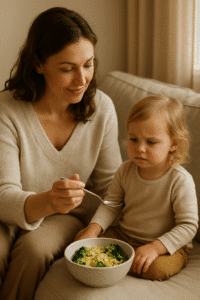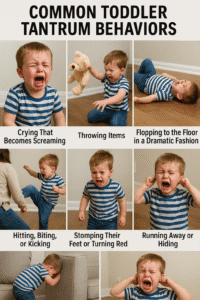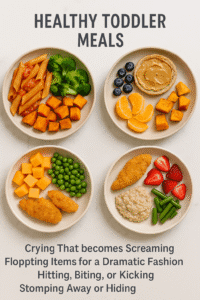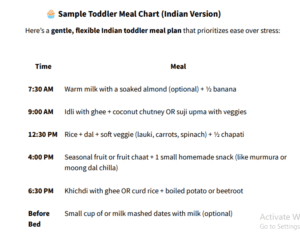You’re Not a Bad Parent — You’re Just Exhausted
The toddler threw a plate onto the floor. Again. You’re standing there, holding your breath, biting back your shout, holding the invisible weight of the parenting manual that never came with the baby. If you’ve ever felt like you’re sinking in this whole gentle parenting thing, or spending your days trying to get your kid to eat a balanced meal
without becoming a full-time negotiator, you’re not alone. And you’re not broken. You’re simply performing one of the hardest jobs on the planet. This article is your peaceful sanctuary — where gentle parenting intersects guilt-free
feeding, and both you and your toddler get to exhale.
 💡What Is Gentle Parenting and Why Toddlers Need It Most
💡What Is Gentle Parenting and Why Toddlers Need It Most
Gentle parenting is neither submissive nor does it entail giving a parent child free rein. Gentle parenting seeks to foster empathy, respect, understanding, and healthy boundaries. Children are confident, independent, and happy. This style is suitable for a child’s age, diligence, and social contribution. Old school parenting practices teach with the carrot and the stick. When your kid does something right or does something good, displays good behavior, you offer them fun activities, treats (they always get treats!), and positive feedback. If your kid does something bad, well, a timeout might be required, perhaps you’ll spank them. Instead of “How can I control my child”? Gentle parenting explores what limits I can set and how I can guide my child to manage themselves in a kind and consistent manner.
At this age, children are not trying to be ‘difficult’. They’re overstimulated, overwrought, or overtired. And this is where you come in — not to fix them, but to guide them.
🧠 How to Handle Toddler Tantrums Without Yelling
 Every parent cherishes their child, wanting to shower them with love and care, whilst also aiming to make every moment spent with them memorable. However, children can, and will, throw tantrums when they become used to this routine of unrestrained love. Most parents, within the early stages of being a parent, face struggles with the child throwing a fit for seemingly no reason. The ‘Age of Tantrums’ is noted to start after the child reaches two years old, and is faced by children irrespective of their gender. Strikingly, this ‘anger phase’ is quite common among babies just before they acquire a new motor skill, such as crawling. Such an event can be very frustrating and, therefore, can make your children throw a fit. Some of the common behaviors seen in toddlers
Every parent cherishes their child, wanting to shower them with love and care, whilst also aiming to make every moment spent with them memorable. However, children can, and will, throw tantrums when they become used to this routine of unrestrained love. Most parents, within the early stages of being a parent, face struggles with the child throwing a fit for seemingly no reason. The ‘Age of Tantrums’ is noted to start after the child reaches two years old, and is faced by children irrespective of their gender. Strikingly, this ‘anger phase’ is quite common among babies just before they acquire a new motor skill, such as crawling. Such an event can be very frustrating and, therefore, can make your children throw a fit. Some of the common behaviors seen in toddlers
throwing tantrums are:
● Crying That Becomes Screaming
● Throwing Items
● Flopping to the Floor in a Dramatic Fashion
● Hitting, Biting, or Kicking
● Stomping Their Feet or Turning Red
● Running Away or Hiding
● Plugging Ears or Screaming “NO!” Over and Over
Tantrums don’t signify a mother’s failure. Rather, tantrums are an essential milestone. A toddler’s brain is still a work in progress, particularly the areas that deal with logic, patience, and emotional control.
This is how you can respond with gentleness and at the same time with authority:
● Breathe Before You Speak: Your calm becomes their calm.
● Validate Feelings: “You’re really upset because you wanted the red cup.”
● Stay Close, Not Controlling: Sit beside them. Be present.
● Offer Comfort, Not Consequences: Comfort now. Teach later.
Every tantrum is a cry for connection, not correction.
🛑Setting Boundaries Without Fear, Shame, or Power Struggles
Boundaries are not discipline. Boundaries are love in action. We parents confuse discipline with dominance, believing we must control every step our child takes to be “good” parents. But real discipline has nothing to do with control; it has everything to do with guidance. And toddlers, above all people, need that gentle guidance — even when they pretend they don’t. Setting limits with compassion, calm, and consistency conveys a significant message to your child:
🧡“You are safe, even when you’re struggling.” Here’s how you can do it — without yelling, threats, or guilt-tripping
💬Be Clear and Consistent
Knowing what is coming next eases a toddler’s feelings of anxiety. Imagine your child felt free to jump on the couch today and get scolded tomorrow; if that’s the case, they will feel lost, not corrected. Stay consistent with your expressions, tone, and actions. Safety and security can be summed up as predictability.
🌱Use Positive Language
So instead of telling them what they shouldn’t do, point out what you’d rather they do.
● Not: “Stop shouting!” You could say, “Let’s use our quiet voice inside.”
● Also, from “Don’t touch that!” You might say, “Let’s both keep our hands on our own stuff.”
This small modification makes it more appealing for your collaborators & removes the bad smell of shame.
💬Be Clear and Consistent
Knowing what is coming next eases a toddler’s feelings of anxiety. Imagine your child felt free to jump on the couch today and get scolded tomorrow; if that’s the case, they will feel lost, not corrected. Stay consistent with your expressions, tone, and actions. Safety and security can be summed up as predictability.
🌱Use Positive Language
So instead of telling them what they shouldn’t do, point out what you’d rather they do.
● Not: “Stop shouting!” You could say, “Let’s use our quiet voice inside.”
● Also, from “Don’t touch that!” You might say, “Let’s both keep our hands on our own stuff.”
This small modification makes it more appealing for your collaborators & removes
the bad smell of shame.
🔁Repeat with Compassion
Yes, you’ll repeat the same thing over and over. And yes, it will be exhausting. But that’s how babies learn. With every calm restatement of the limit, you’re rewiring their brain — and yours — for connection, not conflict.
Boundaries are not walls to hold children in compliance — they’re bridges that create trust.
🍽 The Real Struggle With Toddler Nutrition: Guilt, Pressure, and Picky Eaters
Mealtime with toddlers is hardly Instagram-worthy — more thrown spoons, uneaten vegetables, and three-day-old banana smears. And amidst all of that, we feel guilty. But you’re not failing — you’re feeding a little human with big feelings and an immature appetite.
🥦Why do toddlers become picky
Picky eating isn’t a moral failing — it’s a typical phase. Toddlers aged 1.5 to 3 say “no” to food to feel in control. Top that off with teething or mood swings, and even their perfect dish is on the floor. It is not defiance — it is development.
🚫Why Force-Feeding Doesn’t Work
You offer love; they say no. You beg; they cry. You insist; they scream. It’s not disobedience — it’s a matter of overpower. Force-feeding destroys trust and makes every meal a fight. Want a healthy eater? Let them select, say no, and have faith that their small bodies know when they’ve had enough to eat. Low-pressure meals cultivate a lifetime of habits, not power struggles.
😩The Emotional Burnout of Mealtime Pressure
We never speak about the silent burnout that results when every meal is a battle.
You stress, “Are they getting enough to eat?”
You compare, “How come other kids get to eat better?”
You wonder, “Am I failing?”
Mealtimes should not be minefields.
✨You deserve calm.
✨Your child deserves trust.
✨Food is meant to connect, not stress.
You’re doing better than you know — even on the tough days.
🥗 Healthy Toddler Meals Without Stress or Perfection
 The truth is: Feeding toddlers can be a nonstop chore. You’re instructed to feed them
The truth is: Feeding toddlers can be a nonstop chore. You’re instructed to feed them
“balanced meals,” but I didn’t see anyone showing me how to do that when your child
says no to dal one day, and throws chapati the next. You know, throw in some family
opinions, mom guilt, and Instagram-ready food posts, and it becomes a test you’re
failing every meal.
But here’s the truth: a healthy toddler meal does not have to be perfect. It doesn’t have
to be fancy, just consistent, calm, and given with love. That’s it.
🍛Easy, No-Stress Meal Planning
Toddlers thrive on routine, but that does not mean every meal needs to be gourmet. Some days they will clear a bowl of khichdi, other days they will take just
two bites — and that’s fine too. A stress-free toddler meal is a healthy toddler meal,
which is why it requires letting go of pressure and extending enough trust to believe that little tummies don’t need big portions or perfect plates, just love and consistency.
🥦What a “Balanced” Toddler Meal Really Looks Like (Yes, Even in Indian Homes)
The word “balanced” sounds intimidating, but it doesn’t have to be. For toddlers, a balanced meal simply means:
● A carb (roti, rice, idli, dosa)
● A protein (dal, curd, paneer, egg, or lentils)
● Some veggies or fruit
● Healthy fat (ghee, coconut oil, nut butter — age-appropriate)
You don’t need all the food groups in every meal — aim for balance over the day
entire day.
The word “balanced” sounds intimidating, but it doesn’t have to be. ForFor
toddlers, a balanced meal simply means:
● A carb (roti, rice, idli, dosa)
● A protein (dal, curd, paneer, egg, or lentils)
● Some veggies or fruit
● Healthy fat (ghee, coconut oil, nut butter — age-appropriate)
You don’t need all the food groups in every meal — aim for balance over the entire day.
 Note: Let your toddler regulate the amount he or she eats. Your responsibility is to provide, not to push.
Note: Let your toddler regulate the amount he or she eats. Your responsibility is to provide, not to push.
❤️Parenting Without Guilt: You’re Doing Better Than You Think
Here’s what most parents secretly believe but won’t say aloud — and what they need to hear:
1. 😔 You let them crank cartoons so you could catch your breath. That’s not defeat — that’s surviving, and it’s O.K.
2. 🍽Again, they skipped dinner. You still gave food with love. I’d take that over a clean plate any time.
3. 😡You lost your temper after the fifth tantrum. You’re human. The important part is how you respond with love.
4. 😢You feel guilt resting in your chest, a weight you must bear alone. But feeling guilty is not evidence that you’re screwing up — it’s evidence that you care.
5. 💛Gentle parenting does not equate to being gentle around the clock. It means showing up, even in the mess. Fixing is more important than being flawless.
6. 🛌Waking up in the morning, thinking, “Did I do enough today?” The answer is: Yes. You did.
7. 👣Every time you motherfudging try again, even after a shitstorm of a day — that’s good parenting.
Your child doesn’t require Pinterest meals, soothing voices 100% of the time, or a schedule that always goes smoothly.
They require you — here, now, and full of love.
And you’re already showing up, even on the tough days.
📌7 Takeaway Tips for Calm Parenting and Happy Mealtimes
Before you leave, here’s your friendly reminder: parenting is tough — feeding a toddler is tougher — but you’re doing much better than you realize.
Here are 7 calm and compassionate takeaways to carry into your daily routine:
● ✅ Keep calm, not perfect — your presence, not perfection, is what counts most.
● ✅Establish boundaries with love, not volume.
● ✅Give food, don’t make them take it — they may not always be in the mood to eat, and that’s okay.
● ✅Zoom out — Nutrition is all about balance from day to day, not from meal to meal.
● ✅Rid yourself of guilt — you’re not a failure, you’re learning.
● ✅Repeat with patience — toddlers need reminders and not shame.
● ✅End every day with grace — even the messy ones are full of love.
CONCLUSION
Parenting toddlers is tough, but you’re doing better than you think. Gentle parenting isn’t about being perfect — it’s about showing up with love, setting compassionate boundaries, and trusting your child’s needs. Mealtimes don’t have to be battles, and your presence is more important than the “perfect” plate of food. Remember, you’re not alone in this journey. Each day, with all its ups and downs, is a step toward nurturing your child’s emotional well-being. Keep showing up with grace, even on the tough days. You’ve got this
❓FAQ: Real Answers for Real Parents
1. What do I do when my toddler just won’t eat?
Take a breath — it’s normal. Serve it, relax, and make it their choice. Your toddler is not going to starve. You can trust their appetite (even when it looks small!)
2. Is it okay if my child skips meals sometimes?
Yes, completely. Little ones are just as hungry as adults. As long as they’re getting regular, healthy meals, there’s no harm if they miss a meal now and then.
3. How do I get my toddler to eat vegetables?
Begin with exposure, not pressure. Serve vegetables frequently; eat them yourself, and offer dips or make them into fun shapes. Curiosity compounds when the pressure is off.
4. Am I spoiling my child by being too gentle?
No — being kind in the face of boundary crossing builds emotional strength. Gentle parenting is not permissive; it is respectful and loving direction.
5. What if I yelled today? Did I ruin everything?
Not at all. You’re human. What matters is the repair. A hug, an apology, and trying again tomorrow — that’s powerful parenting.

